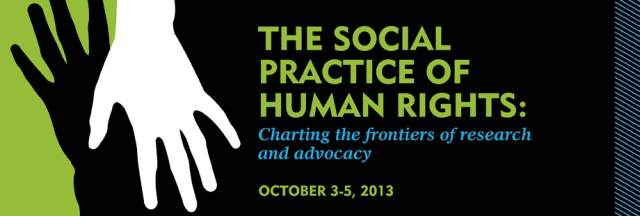How Do Independent Children’s Rights Institutions Redefine Human Rights Engagement?
Location
River Campus - Room M2265
Start Date
10-4-2013 3:15 PM
Abstract
Independent children’s rights institutions (ICRIs), sometimes called children’s ombudspersons and children’s commissioners, have recently been established in many states across the world. ICRIs have diverse objectives; while many are expected to promote and protect young people’s rights, some are limited to monitoring the welfare of children in care of government. ICRIs possess two important qualities that together enable their unique engagement of human rights: independence to use legal powers. Often designated independent of government, powerful limits infringe abilities of some ICRIs to exercise their legal powers. Legal powers range from ability to take on individual cases to challenging government and other institutions on their human rights practices. The present study consists of a comparative study and a case study. It compares European and U.S. ICRIs according to their objectives, independence, and legal powers. It then turns to a case study of Iceland’s Children’s Ombudsperson to answer how ICRIs make decisions to use their legal powers to translate children’s rights into human rights practices. With support of the U.S. NSF, the Swiss NSF, and the Fulbright Commission, this study will address how the emergence of ICRIs has defined and redefined engagement of children’s rights.
How Do Independent Children’s Rights Institutions Redefine Human Rights Engagement?
River Campus - Room M2265
Independent children’s rights institutions (ICRIs), sometimes called children’s ombudspersons and children’s commissioners, have recently been established in many states across the world. ICRIs have diverse objectives; while many are expected to promote and protect young people’s rights, some are limited to monitoring the welfare of children in care of government. ICRIs possess two important qualities that together enable their unique engagement of human rights: independence to use legal powers. Often designated independent of government, powerful limits infringe abilities of some ICRIs to exercise their legal powers. Legal powers range from ability to take on individual cases to challenging government and other institutions on their human rights practices. The present study consists of a comparative study and a case study. It compares European and U.S. ICRIs according to their objectives, independence, and legal powers. It then turns to a case study of Iceland’s Children’s Ombudsperson to answer how ICRIs make decisions to use their legal powers to translate children’s rights into human rights practices. With support of the U.S. NSF, the Swiss NSF, and the Fulbright Commission, this study will address how the emergence of ICRIs has defined and redefined engagement of children’s rights.




Comments
This biennial conference provides a unique space for scholars, practitioners and advocates to engage in collaboration, dialogue and critical analysis of human rights advocacy — locally and globally. Learn more about the Human Rights Center at the University of Dayton >>>.